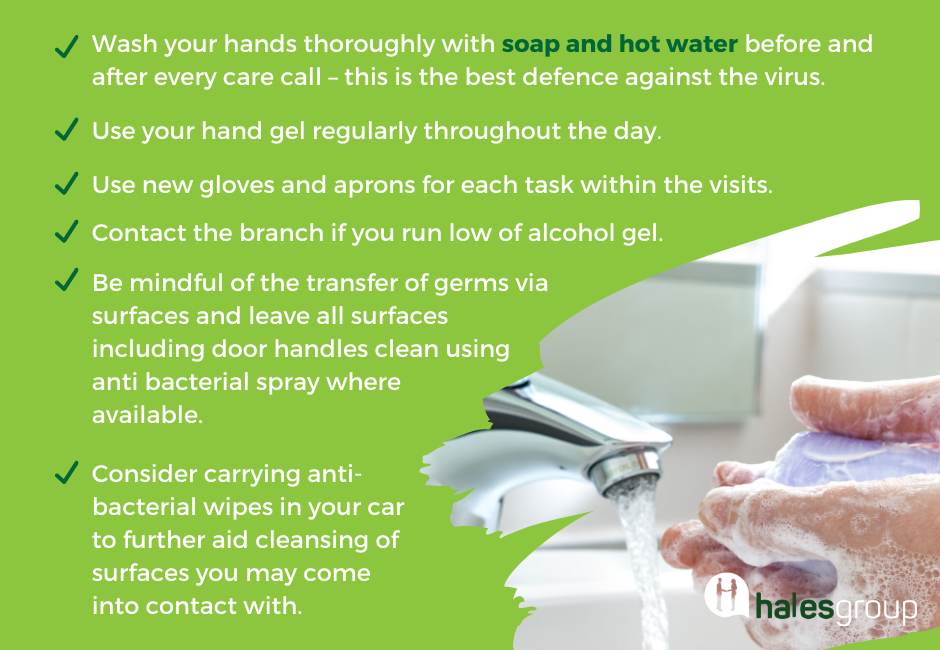Updated Coronavirus Guidance for Care Workers and Staff
03 March | By Irene Amarante
The UK government has recently published new guidance for social care and residential settings on preventing the spread of coronavirus.
Number of cases
As of 9am on 13 March 2020, 32,771 people have been tested in the UK, of which 31,973 were confirmed negative and 798 were confirmed as positive. 10 patients who tested positive for COVID-19 have died. Source: GOV.UK
What is Coronavirus?
A coronavirus is a type of virus. Coronaviruses are a group of viruses that cause respiratory infections (such as the common cold) in humans and animals. Coronaviruses can also include strains that cause more severe illness, such as the virus responsible for SARS.
Generally, coronavirus can cause more severe symptoms in people with weakened immune systems, older people, and those with long-term conditions like diabetes, cancer and chronic lung disease.
Source: NHS, 2020
What are the symptoms?
Although the NHS state there is not enough information at this stage to make specific treatment recommendations.
The NHS states that:
• Symptoms usually mimic those associated with the common cold or the flu.
• Symptoms usually include feeling tired, a high temperature as well as a cough.
• The virus may progress to a severe pneumonia, also causing shortness of breath and breathing difficulties.
• Symptoms are more severe in people with weakened immune systems – particularly older people and those with long-term conditions like diabetes and chronic lung disease.
Spread
Coronaviruses are typically spread like other respiratory infections such as influenza (the flu). This new infection is therefore likely to be passed from person to person when an infected person coughs or sneezes. NHS also state that the virus could be spread through contact with the virus as well as through infected breath and cough droplets.
Therefore, it is really important that you follow our Infection Control and Prevention procedures and wear your PPE, use your hand gel and wash your hands.
It is imperative that you take measures to prevent infection spread including regular hand washing, covering the mouth and nose when coughing and sneezing; and thoroughly cooking meat and eggs.
Additional Good Practice Tips:
• Carry a hand sanitiser with you to make frequent cleaning of hands easy
• Always wash your hands before you eat regularly throughout the day using soap and hot water
• Be especially careful in busy airports and other public transport systems about touching things and then touching your face
• Carry disposable tissues with you and always cover your nose and mouth when you cough or sneeze before disposing of the tissue carefully (catch it, bin it, kill it)

• Do not share snacks from packets or bowls that others are dipping their fingers into
• Avoid shaking hands or cheek kissing
• Regularly clean, not just your hands, but commonly used surfaces and devices you touch or handle including your mobile phone

If you have concerns about yourself or an individual with suspicious symptoms, please do not attend a surgery or hospital. Please contact 111 or your GP surgery for further advice.
Hales Care Workers and Office Staff
Any staff, care workers or otherwise, who have recently had annual leave should confirm to the office PRIOR TO RECOMMENCING WORK:
Where they have travelled from
When they returned
Whether they have any cold or flu like symptoms
If they have travelled to or from any of the countries listed below:
Category 1
• Wuhan City and Hubei Province (China, see map)
• Iran
• Daegu or Cheongdo (Republic of Korea, see map)
• Any Italian town under containment measures (see map)
Category 2
• Cambodia
• China
• Hong Kong
• Italy
• Japan
• Laos
• Macau
• Malaysia
• Myanmar
• Republic of Korea
• Singapore
• Taiwan
• Thailand
• Vietnam
Category 1: Travellers should self-isolate, even if asymptomatic, and call NHS 111 to inform of recent travel. Click here for advice for home isolation.
Category 2: Travellers should self isolate and contact the branch to discuss an appropriate action plan. It is likely they will not need to undertake any special measures, but if they develop symptoms they should immediately call NHS 111 or 999 if they fall into a high risk category & have poor general health.
The guidance for Italy, Iran, and Daegu or Cheongdo (Republic of Korea) applies to individuals who returned from these specific areas on or after 19 February 2020.
Any questions please contact your local branch.

















